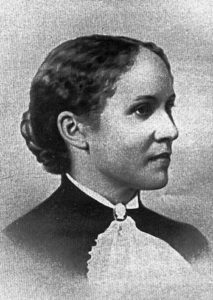
Olivia Davidson
This date in 1854 marks the birth of Olivia Davidson Washington. She was a Black educator and administrator.
The daughter of an ex-slave and freeborn mother (Elias and Eliza), Davidson was one of seven children born in Virginia. The entire family migrated to southern Ohio in 1857, where Elias died, prompting Eliza to settle further north in Albany and Athens. This area was influential as an environment for her education at the Enterprise Academy and an atmosphere of strong anti-slavery sentiment (the site for three routes of the Underground Railroad). Davidson knew and interacted with many Oberlin College liberals and the ever-changing urban area. She began teaching at the age of sixteen in Ohio and Mississippi.
In 1886, she addressed the Alabama State Teacher Association on the topic “How Shall We Make the Women of Our Race Stronger?” stating the way to improve the situation for Black Americans was to work with the girls who were the “Hope of the Race.” After two years in the Magnolia State, Davidson accepted employment in Memphis, Tennessee. It was challenging due to the city's worst four-year financial period in history and a yellow fever epidemic in 1878. She was on summer break in Ohio when the outbreak occurred.
Davidson offered her services as a nurse but was advised to spend time studying at Hampton Normal Agricultural Institute in Virginia. Mrs. Rutherford B. Hayes financed Davidson’s scholarship to Hampton. She delivered her class commencement address. Booker T. Washington (class of 1875) was the postgraduate speaker at the ceremony. She further studied at the Framingham State Normal School. But she was ill upon her departure, the first sign of her failing health. Soon thereafter, she left for Tuskegee, where she served as a teacher, curriculum specialist, principal, fund-raiser, builder, confidant, wife, and mother. Davidson and Booker T. Washington were married in August 1886; she became the stepmother to his daughter Portia and gave birth to two sons, Booker, Jr., and Ernest.
Olivia Davidson Washington, a critical factor in the creation and success of the Tuskegee Institute, died on May 9th, 1889. Her story examines one of the many missing women in history; her accomplishments were numerous, among them, she co-founded an institution that continues to prosper today.
Black Women in America An Historical Encyclopedia
Volumes 1 and 2, edited by Darlene Clark Hine
Copyright 1993, Carlson Publishing Inc., Brooklyn, New York
ISBN 0-926019-61-9